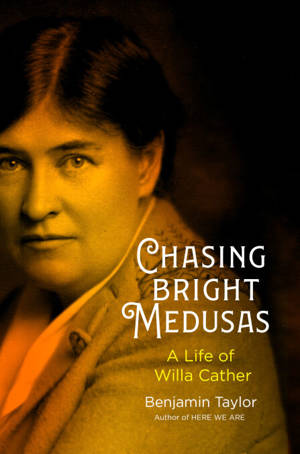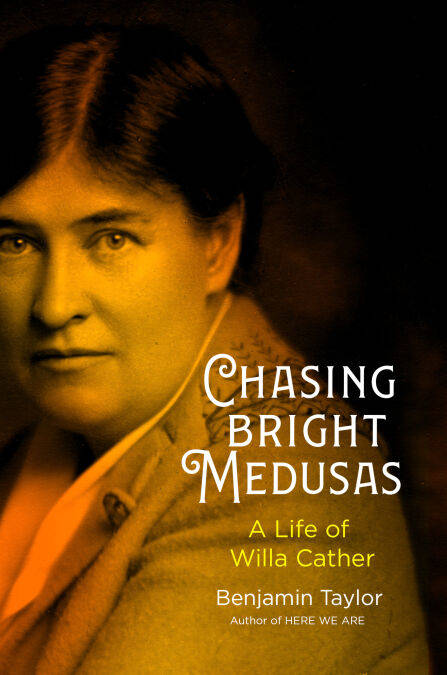
Bedankt voor het vertrouwen het afgelopen jaar! Om jou te bedanken bieden we GRATIS verzending (in België) aan op alles gedurende de hele maand januari.
- Afhalen na 1 uur in een winkel met voorraad
- In januari gratis thuislevering in België
- Ruim aanbod met 7 miljoen producten
Bedankt voor het vertrouwen het afgelopen jaar! Om jou te bedanken bieden we GRATIS verzending (in België) aan op alles gedurende de hele maand januari.
- Afhalen na 1 uur in een winkel met voorraad
- In januari gratis thuislevering in België
- Ruim aanbod met 7 miljoen producten
Zoeken
€ 6,93
+ 6 punten
Uitvoering
Omschrijving
“Chasing Bright Medusas should appeal to anyone — novice or expert — ready to explore Cather’s life and work in the company of a critic so alert to the shimmering subtlety of her style and the hard years of effort that went into crystallizing it.” —The Washington Post
A tender biography of one of the greatest authors of the twentieth century and an elegant exploration of artistic endurance, as told by a lifelong lover of Willa Cather’s work
The story of Willa Cather is defined by a lifetime of determination, struggle, and gradual emergence. Some show their full powers early, yet Cather was the opposite—she took her time and transformed herself by stages. The writer who leapt to the forefront of American letters with O Pioneers! (1913), The Song of the Lark (1915), and My Ántonia (1918) was already well into middle age. Through years of provincial journalism in Nebraska, brief spells of teaching, and editorial work on magazines, she persevered in pursuit of the ultimate goal—literary immortality.
Unlike Hemingway, Faulkner, and Fitzgerald, her idealism was unironic, and she stood alone among the great modern authors—at odds with the fashionable attitudes of her time. Combining intricate analysis with an empathetic, lyrical voice, Benjamin Taylor uncovers the reality of Cather’s artistic development, from modest beginnings to the triumphs of her mature years. His book is simultaneously an homage to her character, a warm consideration of her work, and a case being made to read Cather with renewed vigor.
A tender biography of one of the greatest authors of the twentieth century and an elegant exploration of artistic endurance, as told by a lifelong lover of Willa Cather’s work
The story of Willa Cather is defined by a lifetime of determination, struggle, and gradual emergence. Some show their full powers early, yet Cather was the opposite—she took her time and transformed herself by stages. The writer who leapt to the forefront of American letters with O Pioneers! (1913), The Song of the Lark (1915), and My Ántonia (1918) was already well into middle age. Through years of provincial journalism in Nebraska, brief spells of teaching, and editorial work on magazines, she persevered in pursuit of the ultimate goal—literary immortality.
Unlike Hemingway, Faulkner, and Fitzgerald, her idealism was unironic, and she stood alone among the great modern authors—at odds with the fashionable attitudes of her time. Combining intricate analysis with an empathetic, lyrical voice, Benjamin Taylor uncovers the reality of Cather’s artistic development, from modest beginnings to the triumphs of her mature years. His book is simultaneously an homage to her character, a warm consideration of her work, and a case being made to read Cather with renewed vigor.
Specificaties
Betrokkenen
- Auteur(s):
- Uitgeverij:
Inhoud
- Aantal bladzijden:
- 192
- Taal:
- Engels
Eigenschappen
- Productcode (EAN):
- 9780593298831
- Verschijningsdatum:
- 13/11/2023
- Uitvoering:
- E-book
- Beveiligd met:
- Adobe DRM
- Formaat:
- ePub

Alleen bij Standaard Boekhandel
+ 6 punten op je klantenkaart van Standaard Boekhandel
Beoordelingen
We publiceren alleen reviews die voldoen aan de voorwaarden voor reviews. Bekijk onze voorwaarden voor reviews.









